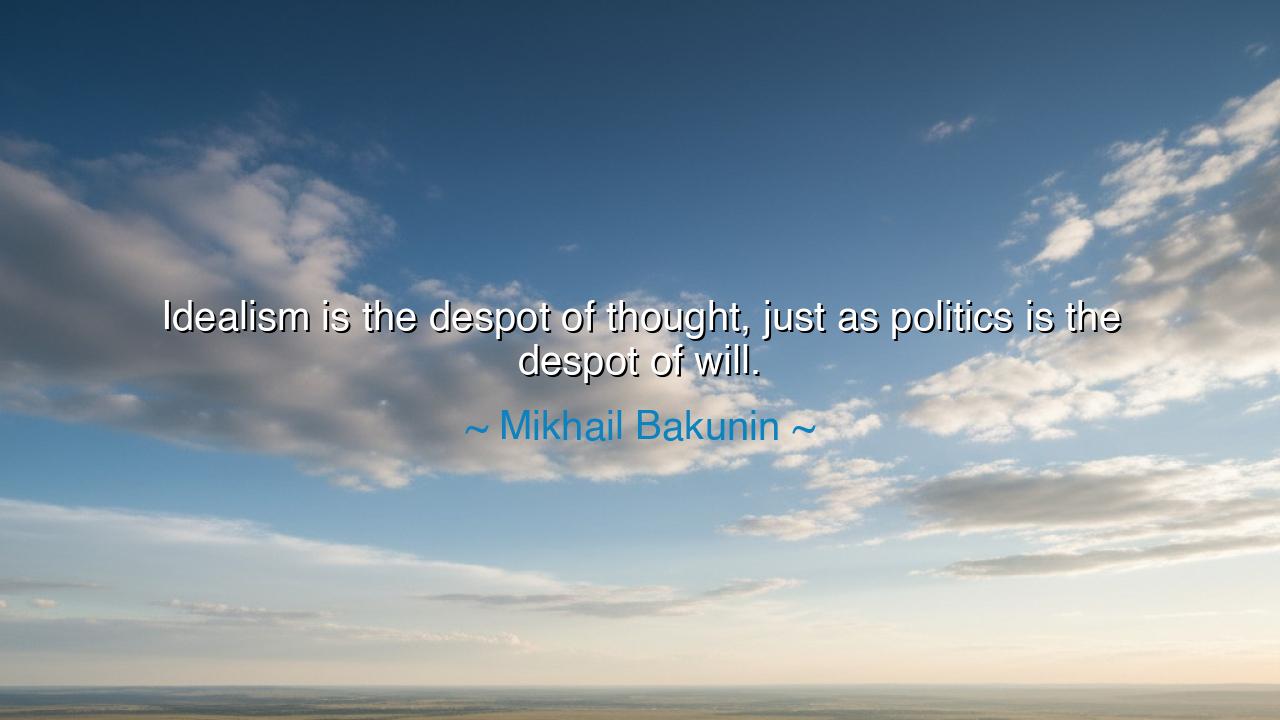
Idealism is the despot of thought, just as politics is the






Hear, O children of fire and freedom, the unyielding words of Mikhail Bakunin: “Idealism is the despot of thought, just as politics is the despot of will.” In this saying, the great anarchist unmasks the twin tyrannies that ensnare the human spirit. For idealism, though noble in appearance, may bind the mind in chains of abstraction, forcing thought into rigid forms that ignore the pulse of life. And politics, though necessary to order society, may enslave the will, compelling action not for freedom, but for power.
Bakunin, who lived amidst the revolutions of the nineteenth century, saw how lofty ideals could become prisons. Philosophers, enthralled by perfect systems, often dismissed the living, breathing needs of people. The despotism of idealism is that it commands thought to bow before theory, and punishes those who do not fit its mold. Just as kings rule bodies, ideas too can rule minds—and no less cruelly.
At the same time, politics stands as the despot of will, for it bends human action to the pursuit of control. Parties, states, and leaders claim the will of the people, but in so doing they often silence true freedom. Bakunin saw this in monarchies and parliaments alike: the state demands obedience, and even revolutions risk birthing new tyrannies in the name of the people. Thus, the will of men and women, once free, is yoked to the ambitions of rulers.
History confirms his warning. The French Revolution, born of ideals of liberty, soon descended into the Reign of Terror, where thought itself was forced to serve ideology, and will was shackled by fear. The ideals of justice became despots of the mind, while the machinery of politics devoured the people it promised to liberate. Here the words of Bakunin stand like prophecy: when thought and will are ruled by abstractions and power, freedom dies.
Therefore, O seekers of wisdom, let this be your lesson: beware the tyranny of idealism that silences the living voice, and beware the tyranny of politics that subjugates the free will. True liberation lies in keeping thought open to life and will faithful to freedom. Bakunin’s cry is not against thought or politics themselves, but against their despotism. Let us not be subjects of ideas or states, but masters of our own spirit.






E_EmXinhNhuHoaHuongDuong _
This quote reflects Bakunin’s skepticism about systems of thought and power that restrict individual agency. Idealism and politics both, in their extreme forms, can shape our behavior without leaving room for genuine personal freedom. How do we ensure that our ideals and political actions remain flexible and open to change, rather than becoming oppressive forces in our lives? Is there a way to embrace ideals and politics without letting them become the despot of our will?
YAyamane akio
Bakunin seems to be critiquing both idealism and politics for their potential to dominate and control human thinking and action. Can we really have a society that functions without ideals or politics? Or is the problem with these forces when they become rigid and inflexible? How do we navigate the tension between striving for a better world and remaining grounded in what is achievable in the political and social systems we have?
Hhanductuan
The comparison of idealism to despotism in Bakunin's quote is intriguing, as it suggests that a rigid commitment to ideals can be as oppressive as political power. Is it possible that the pursuit of perfect ideals can hinder progress by disregarding the practicalities of real-world situations? How do we balance the drive for ideal solutions with the flexibility needed to address the messy complexities of society and politics?
NTNguyen Truong
Bakunin's quote suggests that idealism and politics both exert a dominating influence over our thoughts and actions, respectively. Does this mean that both are inherently limiting? Can idealism stifle critical thinking by pushing us toward rigid, unrealistic goals? Similarly, can politics restrict the will by forcing us to prioritize power dynamics over genuine desires for change? How do we break free from these forms of control and create space for more independent thought and action?